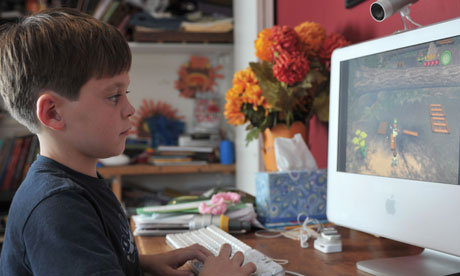
It's a sure bet that many of your students will have clocked up a hefty number of gaming hours over the summer hols.
Teachers and parents may view that in mainly negative terms but there's room for a heated debate here, especially with the news this week that playing brain-training video games may actually reverse the natural decline in cognitive abilities among older people – and potentially young people too – and how playing certain video games can increase wellbeing and happiness.
So here we pull together news stories, videos, teaching resources and great websites which investigate the subject of gaming and look into using aspects of gaming in the classroom.
From the Guardian
Brain-training video games may help reverse cognitive decline in old age
The debate has long been rumbling, can playing video games boost brain power? This research argues that it can. Find out what happened when a group of older people were made to played a custom-designed video game for 12 hours over a month.
Brain training game improves memory - video
This video nicely explains the brain boost in over 60s story and explains how playing NeuroRacer caused more activity in the pre-frontal cortex and increased multitasking skills. Perfect to watch and then debate with your students.
The impact of video games on the human psyche
Can playing video games increase a sense of happiness and wellbeing? Cyberpsychologist Bernie Good says if they're good ones, then yes – and has interesting points to make on how games such as Halo could potentially help people with mental-health issues. Lots of fuel for a class debate here.
Teachers warn children becoming addicted to video games
Why teachers have been working to combat the growing trend of young pupils acting out violent scenes in playgrounds.
Violence and guns in best-selling video games - interactive
This is a great interactive to explore in class. Guardian analysis reveals one third of 50 top games of 2012 depicted real life firearms.
Could Angry Birds lead to mass murder?
Moral panic about violent video games is based on prejudice, ignorance and selective use of flawed research, argues Martin Robbins.
Why we need more women in the games industry
Changes need to be made to teaching science and maths to encourage girls into creative technology careers, which are currently so heavily male dominated.
Xbox one launches in November
The news many of your students will be been waiting in a heady daze for.
Games reviews
Perhaps not one for the classroom, but to pass on for personal time. Encourage students to comment and add their own reviews – writing about something you really know about can be a really empowering experience and who knows where it will lead?
On the Guardian Teacher Network
Playful learning
Thought-provoking observations, tools and practical tips to help understand more about using and making computer games in the classroom – by Microsoft schools.
Teenagers and computers
This guide, written by two ICT teachers, looks at the digital divide between parents and teenagers – great for an assembly or parents' evening resource.
Code Hero
Here's how students can create their own games by manipulating code.
Computer games are safe, says inventor
This news-based English-language activity looks at whether computer games are harmful for children. Perfect for English as a second language (ESL) students.
The best of the web
Tech time versus wild time
Teacher, parent and guerrilla geographer Dan Raven Ellison writes about his quest for a balance between his son's screen time vs wild adventures and other activities – and comes to some interesting conclusions.
Microsoft Education
Great resources, ideas and advice here from Microsoft in the classroom
Dare to be digital
Definitely worth checking out the premier video games development competition – something for students to be aware of when going to college.
Gamebridge Unityversity
Great site for students who want to learn code and make their own games through Unity, a game development engine that can be used on every platform.
Video games stats
Nice chart containing all the necessary numbers.
Games based learning (GBL) for the everyday teacher
Interesting blog on on GBL which works hard to dispell some popular myths plus how to build curriculum unites using video games.







